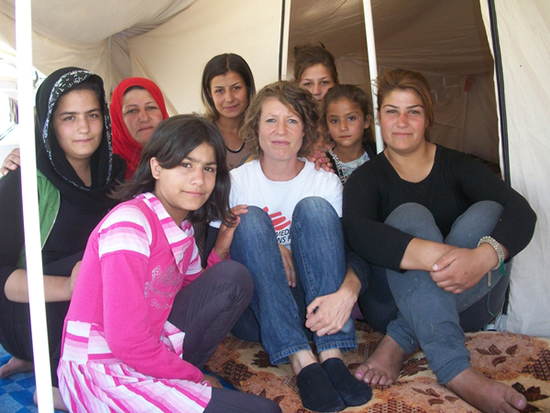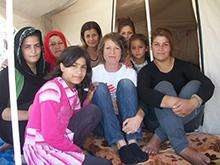Dr. Henrike Zellmann, an MSF psychologist working with Syrian refugees in northern Iraq, talks about the services MSF is offering to address growing mental health needs.

Iraq 2013 © MSF
MSF doctor Henrike Zellmann (center) sits with Syrian refugees currently receiving mental health care in Domeez Camp.
As part of its medical response to the Syrian refugee crisis, Doctors Without Borders/Médecins Sans Frontières (MSF) has been running a mental health program providing psychological assistance to Syrians seeking sanctuary in northern Iraq’s Domeez refugee camp. Teams are seeing patients who experienced traumatic events linked to the war in Syria, or who are suffering because of the conditions they are faced with in the camp. Others were diagnosed with mental health disorders prior to the conflict and have gone a long time without access to medication or care.
MSF's four counselors in Domeez provide 70 to 100 sessions per week for individuals, families, and groups. They work together with doctors, nurses, and community health workers to detect and diagnose patients in need and to provide comprehensive mental health care.
Dr. Henrike Zellmann, a psychologist from Germany, has been with MSF in Domeez since August, working as part of a team that includes one Iraqi and two Syrian psychologists. Here, she explains how the mental health needs in the camp are growing, and how MSF’s services are becoming increasingly crucial.
“In Domeez refugee camp, we are really seeing a situation that is getting worse in terms of mental health needs. People are extremely disillusioned. When they first arrived, they might have had some hope that the situation would last for a couple of months. Now, everybody realizes that the situation is not getting better, and they do not know if or when it will end.
The mental health of the refugees is extremely fragile. There are many triggers that will cause their state of mind to quickly deteriorate: the living conditions they are forced to face on arrival to the camp, memories of the ongoing conflict in Syria, and the level of uncertainty about when the conflict will end, or if they can ever return to a normal life.
The toll of uncertainty
If you are living in a state of uncertainty, your psychological wellbeing is enormously affected. Refugees here are living in this state continuously. Right now, they don’t have a lot of hope. There is no reason for them to hope that the situation will improve in the near future.
We are seeing a lot of people who have more severe mental disorders, such as psychosis. With a heightened sense of futility among the refugee population, the complaints we are treating are far more complex. Although the trauma of war and inadequate living conditions won’t be the sole cause for episodes of psychosis, it can certainly trigger it.
A couple of weeks ago, we had a woman come to our clinic displaying symptoms of delirium. She thought she was pregnant with eleven children. We were worried as she has three children, and we did not know what the situation was like for them at home.
We went to visit her and saw that the conditions were adequate, and that she had a lot of support from her neighbors. We will monitor her case closely and encourage her to keep visiting us for the sessions. Stigma around mental health issues can be a big obstacle here, so it was great to know in this case that the community was showing solidarity with her.
Working with children
When I see how the children here are affected, it is very difficult to imagine what they are going through. I have the feeling they are just losing time, that their years are being wasted.
There is not much for the children here to do: many are still unable to go to school, as there are not enough services in the camp. So they spend their days simply playing in the dust. Some have to find jobs to help support their families, and teenagers as young as 13 and 14 are working and are unable to continue their education.
When we do sessions with the children, it is important that we make them understand that their reactions are normal. They are living in a very abnormal situation, but they need to be aware that how they react is something that so many of their friends are also going through.
One of the most frequent symptoms we see in children is bedwetting. This is a condition that puts an extra burden on the parents, who often do not know how to handle it. It can also increase tension in their relationships with the child, as the child may feel ashamed and embarrassed.
A ten-year old boy came to see us because he was having this problem. He had come to Iraq a few months before and had been reunited with his family in the camp.
We explained to him that what he was experiencing was normal, we gave him some advice on how to overcome it, and we assured him that it wasn’t a big deal. It was so great to see his reaction and relief, and that just by talking so openly about the issue, he was able to overcome a lot of his embarrassment.
Invisible, deep wounds
The mental health wounds are often so invisible to many, but our team is really seeing that these wounds are very deep. One of the main things we do is simply to give the patients time to express themselves.
The patient and the counselor work together to find ways to cope with the situation, to alleviate the symptoms, and to finally gain more control over their reactions. A lot do not want to burden their own family with their problems. Speaking to a non-family member in a confidential environment really does help.
Sometimes people arrive to the clinic in a very upset and traumatized state. They are crying or are just completely stressed out. We are able to provide a safe space for patients to express themselves, to work on their reactions, and to feel they are not abnormal, that they are not going crazy.
As soon as the door is closed, we spend time with them, and we listen. Without being intrusive, together with the patient, we help them to heal. Although the wounds can heal, the suffering may not disappear. But if we can help them to find ways to better cope and deal with that suffering, then that is something.”




